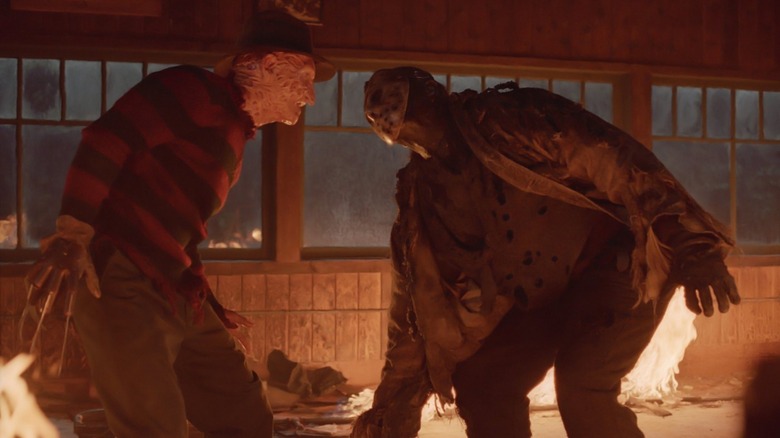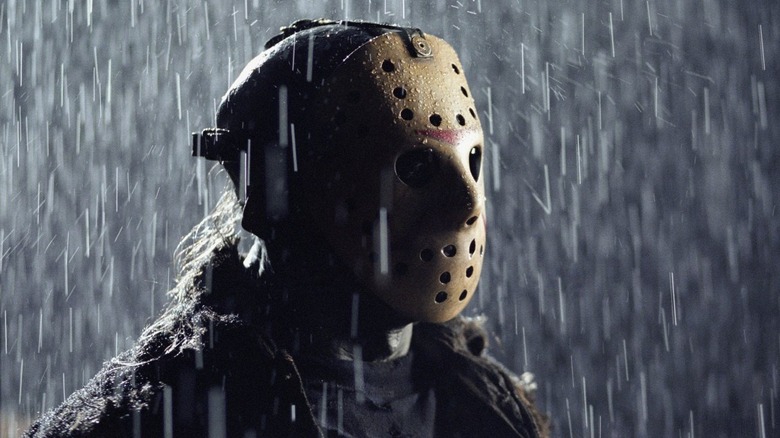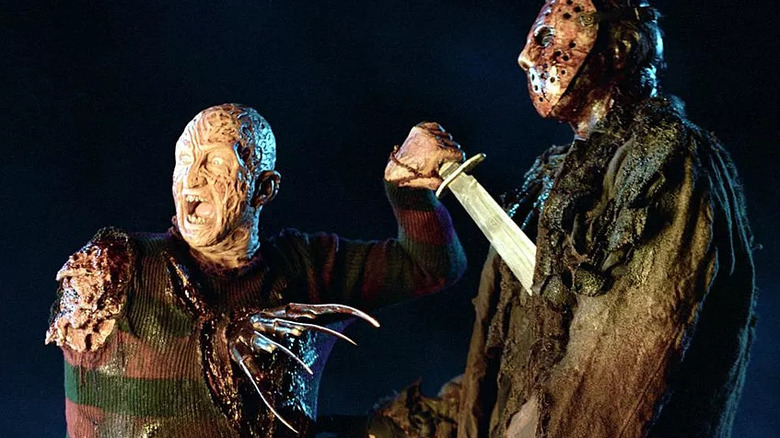Two Of Star Trek's Most Prolific Writers Took On A Draft Of Freddy Vs Jason
In 1984, Jason Voorhees (Ted White) finally met his end in Joseph Zito's "Friday the 13th: The Final Chapter." He was finally dead. In 1991, Freddy Krueger (Robert Englund) finally met his end in Rachel Talalay's "Freddy's Dead: The Final Nightmare." He was finally dead. In 1993, Jason Voorhees met his end again in Adam Marcus' "Jason Goes to Hell: The Final Friday." He was finally dead again. In 1994, Freddy Krueger finally met his end again in "Wes Craven's New Nightmare." He was finally dead again.
The two monsters were once again somehow alive to face off in Ronny Yu's excitable 2003 battle royale "Freddy vs. Jason," a film that felt like it came too late to bank on the popularity of the characters, but that was a massive hit nonetheless. Longtime fans of 1980s slasher movies were eager to see two of the most popular monsters of its heyday (played here by Englund and Ken Zirzinger) finally stab one another repeatedly, and the film did not disappoint. It's not a terribly sophisticated film, but it provides all the violence and supernatural inter-monster shenanigans one might hope for.
The road to "Freddy vs. Jason" was long and circuitous, and several drafts were written leading up to its filming. The credited screenwriters, Mark Swift and Damian Shannon, even once had an idea to include Pinhead from "Hellraiser" in an end-of-the-film twist.
What many of the film's fans may not know is that, sometime in 1994, Ronald D. Moore and Brannon Braga, two of the most prolific "Star Trek" writers at the time, wrote a draft of "Freddy vs. Jason." The script can be read online, and was discussed in the 2017 book "Slash of the Titans: The Road to Freddy vs. Jason" by Dustin McNeill.
It's very weird.
The O.J. Simpson trial was an influence
The Moore/Braga script was hardly the only one to compete with the Swift/Shannon script — rumor had it there were dozens of "Freddy vs. Jason" scripts floating around Hollywood at the time — but it might be one of the more striking and bizarre. Notably, it took inspiration from the then-recently-televised O.J. Simpson murder trial.
Recall that Jason Voorhees is a campfire story character, a lakeside boogieman who stalks and kills teenage campers at a remote sleepaway camp in the woods of New Jersey. At some point during the sequels to the original "Friday the 13th" — probably sometime around the sixth film — Jason went from a woods-bound boogieman into an immortal instrument of death. He never spoke and the face under his hockey mask was mostly missing. Moore and Braga conceived of a story wherein Jason is arrested by the police for his many murders and put on the stand to defend himself at trial. That someone like Jason Voorhees would be entitled to a legal defense counsel is the stuff of broad satire. It seems that Moore and Braga didn't want a "Freddy vs. Jason," but a "Freddy v Jason."
Jason's defense lawyer would be a character named Ruby Jarvis, a relative of Tommy Jarvis and his sister Trish, who appeared in several "Friday the 13th" sequels. Jason would spend most of the time in prison, while Freddy stalked people in their dreams. In this script, it would be revealed that Freddy once had an affair with Jason's mother (!) and that it was he who killed Jason back when he was a boy (!!). Freddy re-entered the real world through magical shenanigans, complete with his magical nightmare powers intact.
The case of Freddy v Jason
Prior to becoming an immortal dream demon, Freddy was a vicious killer of innocent children. Over the course of the Moore/Braga script, Freddy would come to realize that Jason was the child victim of his that he was never able to dispatch, and resented that he kind of helped create a rival. The film ended, naturally, with the two tussling. The battle took place in a modern shopping mall, and Jason blew up Freddy and himself using an explosive propane tank. Throughout the movie, Jason was presented as somewhat human and sympathetic. He was a monster and a mass murderer, yes, but also grew up having been abused and murdered by a demonic child-killer. Jason was an outcropping of Freddy's evil.
The final shots of the movie showed Jason Voorhees' childhood home being bulldozed, and a closeup of a childhood picture of the killer prior to his drowning in Crystal Lake. In killing Freddy, Jason kind of absolved himself of his monster-hood.
The tone of the script is all over the place. Parts of it are meant to be broadly satirical of O.J. Simpson — a tasteless exercise at best — while others are meant to be packed with wild, bloody monster mayhem. In the 1990s, a lot of well-worn genre films were turning to self-satire anyway, so a "funny" deconstructionist take on slasher material was warranted. Indeed, Wes Craven's films "New Nightmare" and "Scream" took a similar satirical tone, mocking or winking at horror conventions while they played out in real-time.
Give the script a read sometime. It's a hoot. Would it have made a good "Freddy vs. Jason" movie in the mid-1990s? Who's to say?


